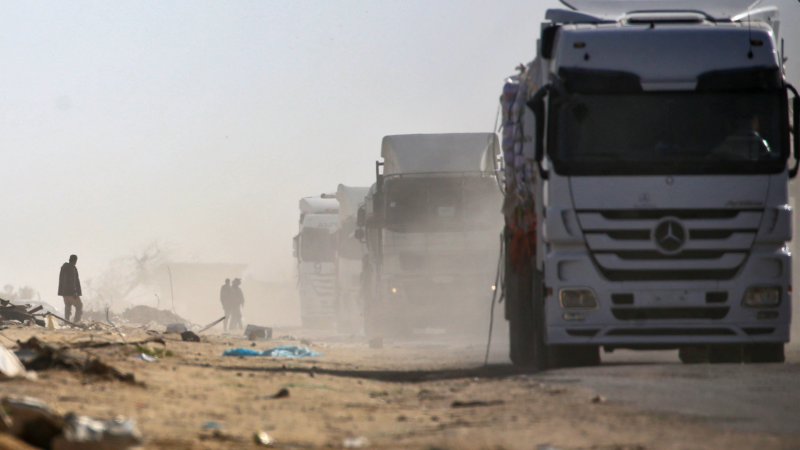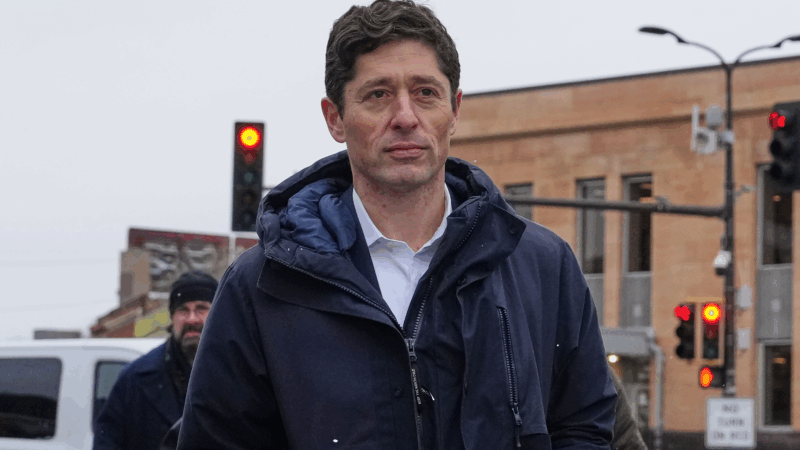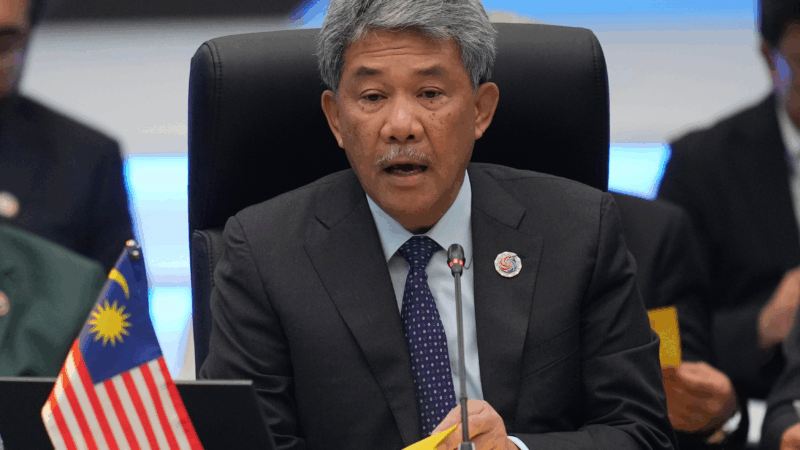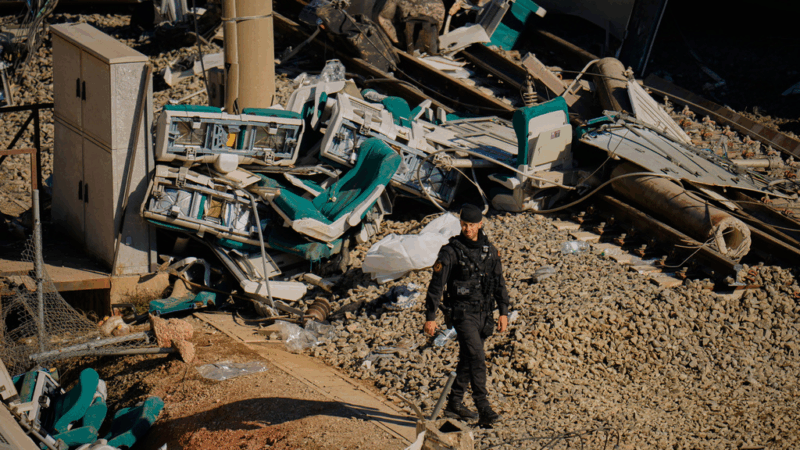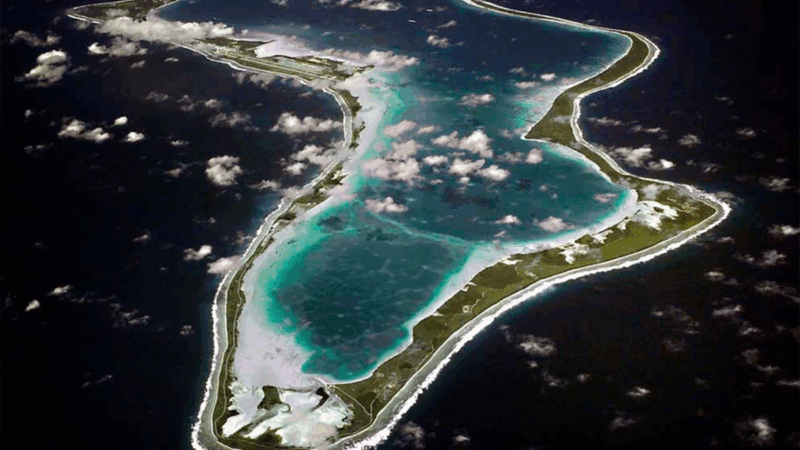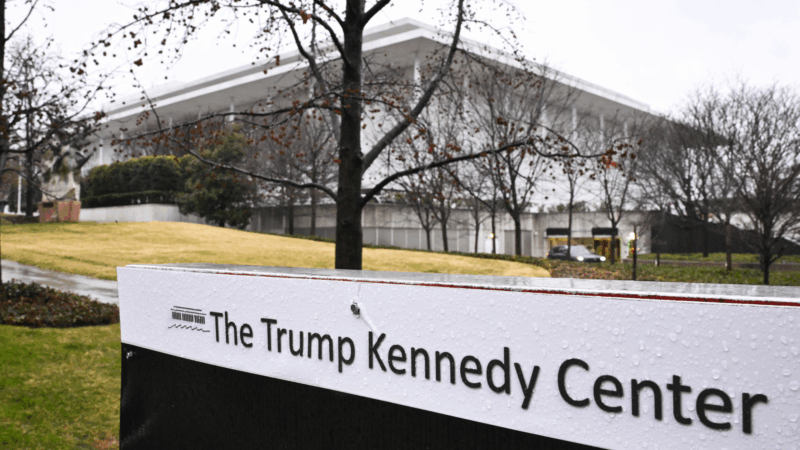Israel stops the delivery of aid to Gaza until Hamas accepts U.S. ceasefire extension
TEL AVIV — Israel says that it is stopping the entry of all goods and supplies into the Gaza Strip, citing what it described as Hamas’ refusal to accept a U.S. proposal to extend the first phase of the six-week-old ceasefire, and threatened “further consequences.”
Prime Minister Benjamin Netanyahu’s office said President Trump’s Middle East Special Envoy Steve Witkoff had proposed an extension of the first phase of the ceasefire with Hamas through Ramadan and Passover which could see the release of the remaining 59 Israeli hostages still held in Gaza. Ramadan began Friday night and ends March 29. Passover ends on April 19.
The new proposal Israel has announced would have Hamas release half of the living and dead hostages at the start of the seven-week ceasefire period, and would secure the release of the remaining hostages by the end, if the two sides reach an agreement on a permanent end of the war.
“Israel will not allow a ceasefire without the release of our hostages,” according to a statement from the prime minister’s office. “If Hamas continues its refusal, there will be further consequences.” The statement did not elaborate on what consequences could follow, but said Israel had a U.S. commitment to allow it to resume the war if ceasefire negotiations were deemed ineffective.
Hamas accuses Israel of blackmail
Hamas, in a statement, accused Netanyahu of trying to evade the framework of the ceasefire agreement that went into effect Jan. 19 after 15 months of conflict sparked by the Hamas-led Oct. 7, 2023 attack on Israel. More than 48,000 Palestinians were killed in the conflict, according to Gaza health officials, and most of the buildings in the occupied Palestinian territory were either destroyed or damaged.
The ceasefire was being implemented under three phases. Under the first phase, Palestinian Hamas militants released 33 Israeli hostages held in Gaza after being seized in the Oct. 7, 2023 attack on Israel that also killed around 1,200 Israelis. In exchange, Israel freed around 1,900 Palestinian prisoners and detainees.
The second phase of the ceasefire was set to begin Sunday, under the terms of the deal, and see the release of the 59 Israeli hostages still held in Gaza, 32 of whom are believed to be dead. It also aimed to secure a more permanent end to the conflict.
But negotiations in Cairo last week failed to achieve any consensus on implementation of the second phase.
Hamas accused Israel of a “blatant attempt” to evade the original agreement.
“Netanyahu’s decision to stop humanitarian aid is cheap blackmail, a war crime and a blatant coup against the agreement. The mediators and the international community must move to pressure the occupation and stop its punitive and immoral measures against more than two million people in the Gaza Strip,” Hamas said in a statement.
Israel said that almost 21 thousand trucks of aid entered Gaza since the beginning of the ceasefire in January.
Aid organizations estimated that almost the entire 2 million Palestnians living in Gaza depended on this life saving aid, and there were famine-like conditions in Gaza because such little aid was going in.
After months of relying on canned goods, people in Gaza started to slowly find fresher vegetables, fruits, and frozen meats in the market.
40-year old Ibrahim Abu Sultan from Jabaliya refugee camp in northern Gaza said that the influx of aid helped his family.
“Before the ceasefire, we would eat one meal every two or three days. Now we can at least heave a meal a day,” Abu Sultan said.
The expiration of the first phase of the ceasefire coincided with the first day of Ramadan. It was the first Ramadan in Gaza not under Israeli bombardment since the beginning of the war.
Videos posted online showed lights and decorations strung among the destruction of the buildings as people gathered to break the fast together among the rubble of their homes.
Trump will meet a released Israeli hostage, according to released hostage’s family
Eli Sharabi, who was released from Gaza last month after 491 days in Hamas captivity, will meet with President Trump on Tuesday, Sharabi’s brother, Sharon, told Israeli Channel 12.
Trump megadonor Miriam Adelson, an Israeli-American, is flying the Sharabi family to Washington for the meeting, the released hostage’s brother said.
Eli Sharabi, who was abducted from his home in Kibbutz Be’eri on Oct. 7, 2023, detailed the harsh conditions of captivity in the first lengthy interview given by an Israeli freed in a recent round of hostage releases.
In the interview with the Israeli television documentary program Uvda, Sharabi described his hands and legs being shackled for the entire duration of his captivity, most of which he spent in underground Hamas tunnels. He said he was held with three other hostages, and spoke of enduring extreme hunger and losing around 66 pounds while he was held hostage.
Sharabi said when a Hamas operative discovered his family’s home had been bombed by the Israeli military, he was severely beaten, suffering broken ribs that made it difficult for him to breathe for days.
“I didn’t care about the beatings. They broke my ribs, but the hunger was worse. I just wanted them to give me half a pita,” he said. “Your stomach sticks to your back. You can literally see it caving in and can’t believe it’s happening to your body.”
He called on Israel to make all efforts to secure the release of all Israeli hostages as soon as possible.
Sharabi’s wife, two daughters and brother were killed in the Hamas-led attack Oct. 7, 2023.
Itay Stern in Tel Aviv and Ahmed Abuhamda in Cairo contributed to this report.
Minnesota Gov. Tim Walz, Minneapolis Mayor Jacob Frey have been subpoenaed by the DOJ
The Minnesota attorney general and St. Paul mayor have also been subpoenaed as local, state and federal officials have clashed in the aftermath of the shooting of Renee Good by an ICE agent.
ASEAN won’t endorse election in military-ruled Myanmar, Malaysia says
Malaysia's foreign minister Mohamad Hasan cited concerns over the lack of inclusive and free participation.
‘The miracle’: A 6-year-old walked away from the train wreck that killed her family
Her parents, brother and cousin were killed in the collision, but the girl was found walking barefoot on the tracks. She's being cared for by grandparents after receiving three stitches in her head.
Trump says U.K. return of Chagos Islands to Mauritius is a reason to acquire Greenland
The president previously supported Britain's agreement to hand back sovereignty of the Indian Ocean archipelago, where the U.K. continues to lease the U.S.-U.K. Diego Garcia military base.
Here’s who’s canceled their Kennedy Center performances since Trump took over
The Martha Graham Dance Company is just the latest to say they will no longer perform at the Kennedy Center since Trump took over last year.
An Alabama mayor signed an NDA with a data center developer. Read it here.
The non-disclosure agreement was a major sticking point in a lively town hall that featured city officials, data center representatives and more than a hundred frustrated residents.

